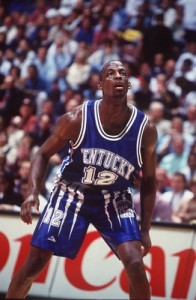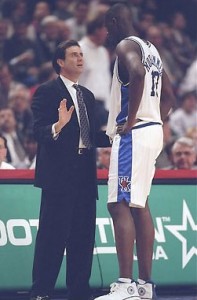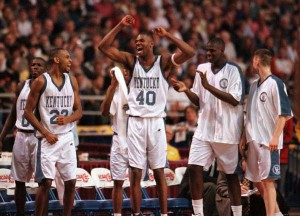Past Imperfect: Rodrick Rhodes — Untouchable Cats’ Unwanted Man
Posted by JWeill on February 22nd, 2012Past Imperfect is a series focusing on the history of the game. Every two weeks, RTC contributor Joshua Lars Weill (@AgonicaBoss|Email) highlights some piece of historical arcana that may (or may not) be relevant to today’s college basketball landscape. This week: the dominance of Kentucky’s 1996 ‘Untouchables,’ and the banishment of Rodrick Rhodes.
Rodrick Rhodes was a very good college basketball player. He was versatile, athletic, long and skilled. He was good enough as a teenager that most folks who knew of him figured he wouldn’t be in college very long, that one or maybe two seasons at Kentucky, his college choice, would be all that was necessary for Rhodes to showcase the game that would make him an instant NBA millionaire. A month into his freshman season, it looked like those lofty expectations were spot on. The Jersey City, NJ, native wowed national audiences, had ESPN’s Dick Vitale preaching his impending stardom and was set up neatly to slide in as the Wildcats’ next mega-star, following in the imposing footsteps of another former New York City-area prep star, Jamal Mashburn.
But Rhodes wasn’t Mashburn, either in internal strength or in shooting touch, and somewhere along the way to getting his name in the rafters, something changed. Rhodes showed some flaws, and by the end of his sophomore season, Kentucky coach Rick Pitino seemed to sour on Rhodes and on dealing with Rhodes’ older brother, Reggie, who Pitino felt was whispering NBA dreams nonstop into his brother’s ear.
Finally, following a series of disappointing showings by Rhodes in his junior season, including a miserable game in UK’s Elite Eight loss to North Carolina, Pitino had had enough. After the enigmatic junior forward opted to enter his name into the NBA Draft pool, Pitino moved on. When Rhodes bombed an audition for pro scouts and decided he wanted to return for his final season at Kentucky, Pitino reportedly told Rhodes he could redshirt if he wanted to return, but whether out of pride or exhaustion with his situation, Rhodes demurred and instead asked for his release to transfer. Pitino obliged and Rhodes the next great Kentucky star became the Rhodes the ex-great Kentucky recruit.
Pitino’s replaced Rhodes with Ron Mercer, a five-star small forward from Nashville who arrived in Lexington as the anti-Rhodes, preaching a willingness to play whatever role the team needed, never gripe about playing time and learn from his more seasoned teammates. The addition of Mercer and fellow recruit Wayne Turner completed Kentucky’s 1995-96 roster, which was built around senior All-America candidates Tony Delk and Walter McCarty, junior Derek Anderson and sophomore Antoine Walker.
Mercer’s attitude was just what Pitino needed for this, his best chance to win a national championship. Always an ace recruiter and at the time arguably the best cultivator of professional-grade basketball talent in the college game, Pitino had assembled a team for the ages, one whose dominance would be matched only by its remarkable cohesion, especially on the defensive end. The Wildcats would work with a rotation of about 10 players, most nearly interchangeable in their ability to shoot, run and press their opponent and in their unmistakable talent.
“I’ve never had 10 players so close in ability,” Pitino said at the time.
The result of all that ability was an onslaught of skill and length that observers and pundits touted before the season as among the best ever assembled at a college program. There appeared to be no flaws. The Cats had shooters and big men and length and coaching. How fascinating, then, when just two weeks into Kentucky’s season this supposedly unbeatable basketball machine in blue would go down in defeat at the hands of a Massachusetts squad in many ways Kentucky’s mirror opposite: slow where UK was fast, frontcourt heavy where UK was not, reliant on a short rotation where Kentucky featured depth. It was an unlikely rivalry that would continue the entire season to college hoops fans’ delight.
After Kentucky’s surprising 92-82 loss to John Calipari’s Minutemen team on November 28, the Wildcats regrouped and settled into a season-long parade of basketball dominance. After beating Wisconsin-Green Bay by 12 in early December, no team would come within 13 points of Kentucky until the finals of the SEC Tournament, a period of over three months. Kentucky would post a scoring differential of over 25 points a game.
The loss to Massachusetts had upset the Cats’ balance, but it had also convinced Pitino that his experiment of using his senior Delk as a point guard was a failure. Instead, Pitino put the balls into the hands of one of his least recruited players, walk-on Anthony Epps. The move worked perfectly, freeing Delk up to shoot and putting the capable and scrappy Epps into the rotation. Having been stung once, the increasingly confident Wildcats and their notoriously perfectionist coach made it clear that no one was going to surprise them again.
Kentucky’s roll through the SEC began to take on historic dimensions. In mid-January, the Wildcats scored 86 points in the first half to blitz LSU in Baton Rouge. A few weeks later, UK humiliated Vanderbilt on its home floor, too, scoring 120 points in a 39-point rout.
By the middle of February, it became clear that the Wildcats were the nation’s best team. How then had they been stuck at No. 2 in both polls since November? Remember those pesky Minutemen, the ones who had humbled the Cats? They were still undefeated through 26 games. Plus, hadn’t UMass already beaten the mighty Wildcats head-to-head? Yes, indeed.
Around this time chatter got louder about Kentucky becoming the first team to go 16-0 in the SEC regular season, a run of perfection that had never happened in the modern era. A loss by Massachusetts earlier in the week returned Kentucky to the top spot in the polls, just in time for a Senior Day game against Vanderbilt. With precision and flair, Kentucky completed the its SEC season with a 101-63 destruction of the Commodores. Back in their perch atop the polls and riding the nation’s longest winning streak, it appeared unlikely that anyone would slow down Pitino’s squad, and certainly not before the NCAA Tournament’s last weekend.
But if the SEC Tournament in New Orleans was supposed to be a coronation of the Cats, someone forgot to inform forward Dontae’ Jones and the Mississippi State Bulldogs. Peaking at the right time, Mississippi State outrebounded, outshot and out-toughed the heavily favored Wildcats in the championship game. The 84-73 Bulldogs win sent shockwaves through college basketball. Goliath had shown weakness after all.
For Pitino, the loss to Mississippi State couldn’t have come at a better time. Seeking the championship that would validate and cap his reclamation job at Kentucky, Pitino no longer had to remind his team of the stakes. One more loss, they now understood, and all those wins, dunks, highlight reels and accolades would mean nothing. The disappointment of the SEC title game was now the only motivation the Wildcats would need.
Sent to the Midwest Region as its No. 1 seed, Kentucky showed up in Dallas all business. San Jose State, the #16 seed with a losing record, lined up opposite the Cats in the first round, kept the first half close. The six-point halftime lead had observers wondering if the fallibility the Wildcats had shown in the SEC tournament had shaken something. But in the second half, Kentucky started to answer its critics. The Cats outscored the Spartans 63-31 in a 110-72 thumping.
Second round opponent Virginia Tech didn’t fare any better, losing by 24. Utah All-American Keith Van Horn would net 23 against Kentucky in the Sweet Sixteen, but his team would lose by 31 as a dozen Wildcats scored. Not even future Hall of Famer Tim Duncan would present much of a challenge to these Big Blue brutes, scoring just 14 points in an 83-63 Kentucky win that was never in doubt.
Pitino’s team had navigated through the storm of potential upsets unscathed and done what it was supposed to in reaching the Final Four. Awaiting them was their old rivals, UMass, who had won the East Region to set up a rematch on March 30 in the nightcap of the two Final Four games.
As in the first meeting, UMass proved as tough a matchup for the Wildcats as any team in the nation. Undersized but highly disciplined UMass guard Edgar Padilla kept his team close, spreading the ball around and weaving his way through Kentucky’s full-court traps. National Player of the Year Marcus Camby worked through constant double-teams all night, and while he finished with 25 points he went over 15 minutes without a basket. Meanwhile, a focused Kentucky built a big lead early in the second half, leading by as many as 15 with five minutes gone. But UMass didn’t fold. Instead, spurred on by their coach’s frantic sideline pleas, the Minutemen closed strong, pulling to within three points, 73-70, on Padilla’s three-pointer with just over a minute remaining.
With Kentucky having won so many games by so many big margins, like the UNLV team of 1991, fans and writers wondered if the Wildcats might struggle in a close game. Instead, the Cats maintained their composure and made their free throws down the stretch, finishing off their November nemesis and earning them a shot at the school’s sixth NCAA title two evenings later with an 81-74 victory.
Revenge for the team’s only losses that season had loomed as a possibility when Mississippi State also reached the Final Four. But instead the Wildcats got scrappy and unpredictable Syracuse and its difficult 2-3 zone. The Orange had ridden senior forward John Wallace all the way to the finals. Wallace had willed Syracuse to within reach of the school’s first NCAA title, scoring 21 points against Mississippi State.
In the title game, Wallace was as good as advertised, pacing Syracuse with 29 points and 10 rebounds. Whenever the Orange needed a basket, Wallace seemed to deliver. Kentucky, though, was struggling with its shot. Every time the Cats appeared poised to deliver a knockout blow, Wallace or teammate Todd Burgan seemingly had an answer. Late in the second half, Delk hit a three-pointer while falling into his team’s bench. Anderson hit another from the top of the key and Kentucky began to pull away. Syracuse got the ball back down by just four points, but it was unable to score, Wallace committed his fifth foul on the miss and the game was over.
Kentucky’s stable of thoroughbreds had delivered on the promise of six months prior, bringing the program all the way back from the purgatory of probation. Pitino dubbed his team “The Untouchables.” Fuzzy Levane, a former Knicks scout and friend of Pitino’s, marveled at the job his friend had done: “How many other guys could get 10 or 12 kids to run around the whole game like that?”
It was also impossible not to see that, along with Kentucky’s vaunted pressure defense, it had been Rod Rhodes’ replacement, the freshman Mercer, who had provided the biggest lift; the lift, in fact, that Rhodes himself had been unable to provide the previous three postseasons. Mercer’s 20 points on 8-for-12 shooting in the title game helped Kentucky overcome the Orange’s tricky zone in a way Rhodes’ inconsistent stroke never could have. No one who had watched Rhodes firing away helplessly in the Wildcats’ loss to North Carolina the year before could have said otherwise. Not even Rhodes himself.
”They all stopped trying to be Mashburn and depended on each other,” the now banished Rhodes said of watching his former teammates win the title. Of course, it was Rhodes who had been the one first tapped then stuck trying to replace the irreplaceable All-American Mashburn. And now, with Rhodes a continent away, there were no holes anymore to fill.
Pitino had his validation. The Kentucky program had completed the difficult trek from humiliation to unquestioned greatness. They’d done it with overwhelming talent, pressure and teamwork, an interchangeable roster of long, athletic and hard-working basketball players. And they don’t it without Rhodes, the forgotten phenom. Right or not, Rhodes’ legacy will be to many as the player whose absence galvanized a bunch of great talents into a great team.
Over the next few years, players from the 1995-96 Kentucky team would go on to dot rosters across the NBA. Pitino would bring Kentucky to within a couple of made free throws of a repeat championship the next season before eventually taking big money to try and return the Boston Celtics to glory as well. That same year Rhodes also finally reached the pros as a surprise first-round draft pick out of Southern Cal.
Neither Rhodes nor Pitino would last four seasons in the NBA.















































Great read… 16 years later, it’s Calipari at the helm for Kentucky trying to make a similar kind of run. Only this time, I doubt it’s the team it lost to earlier (Indiana) that is UK’s biggest challenge to a title